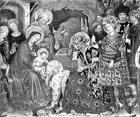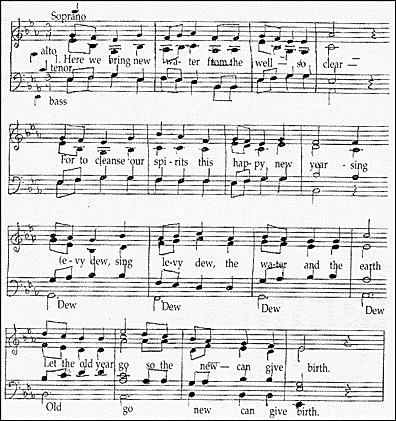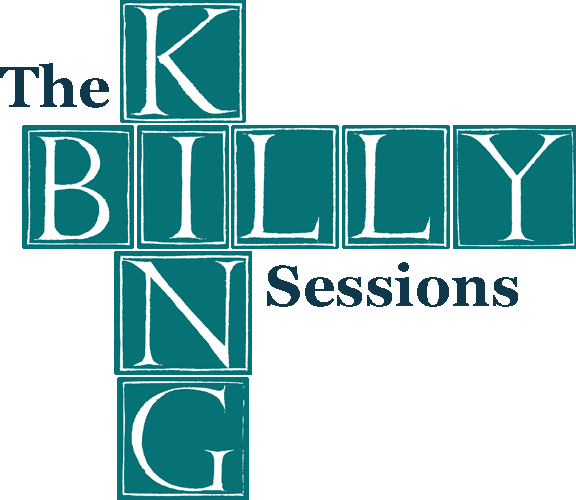 Here
we bring you water Here
we bring you water
from the well so clear
For to worship God
in this happy New Year
Chorus:
Sing levidue, sing levidue
The water and the wine
The seven bright gold wires
And the music that do shine.
Sing
reign of fair maid with gold upon her toe
Open you the west door and turn the old year go
Chorus
Sing
reign of fair maid with gold upon her chin
Open you the east door and let the new year in
Chorus
Here
we bring you water from the well so clear
For to worship god in this happy new year
Chorus
 It
was formerly sung before dawn on New Year's Day by poor children
who carried about a jug of water drawn that morning from the well.
With a sprig of box or other evergreen they would sprinkle those
they met, wishing them the compliments of the season. To pay their
respects to those not abroad at so early an hour, they would serenade
them with the following lines, which, while connected with the “new
water” tradition, contain much that is of doubtful interpretation,
and are a fascinating puzzle for folk-lorists. [The Project Gutenberg
EBook of Christmas in Ritual and Tradition, Christian and Pagan,
by Clement A. Miles] It
was formerly sung before dawn on New Year's Day by poor children
who carried about a jug of water drawn that morning from the well.
With a sprig of box or other evergreen they would sprinkle those
they met, wishing them the compliments of the season. To pay their
respects to those not abroad at so early an hour, they would serenade
them with the following lines, which, while connected with the “new
water” tradition, contain much that is of doubtful interpretation,
and are a fascinating puzzle for folk-lorists. [The Project Gutenberg
EBook of Christmas in Ritual and Tradition, Christian and Pagan,
by Clement A. Miles]
Trefor
Owen describes the context for this song in Wales. Very early on
New Year's Day about three or four o'clock in the morning, groups
of boys came round to the houses in the neighbourhood, carrying a
vessel of cold spring water, freshly drawn, and twigs of box, holly,
myrtle, rosemary or other evergreens. They sprinkled the hands and
face of anyone they met for a copper or two. In every house, each
room was sprinkled with New Year's water and the inmates, who were
often still in bed, wished a Happy New Year. For this service and
wish they were also gifted with coins. The doors of those houses
which were closed to them were sprinkled with the water. The verse
was sung during the sprinkling.
In certain
parts of Wales this custom is called dwr newy (literally, new water).
The exact meaning of the phrase, “levy dew” is unknown,
although there have been attempts to trace it to llef I Dduw (Welsh
for “cry of God”). This seems to be an imposition of
a Christian interpretation on a much older custom. Although the
fair maid is now equated with the Virgin, Owen thinks it likely
that this custom derives from “an early well-cult made acceptable
to medieval Christianity by its association with the Virgin and
perpetuated both by the desire to wish one’s neighbour well
at the beginning of a new year and by the small monetary payment
involved. [Owen, Trefor, Welsh Folk Customs, Llandysul, Dyfed: Gomer
Press 1987]
[Key
D]
|
so far


